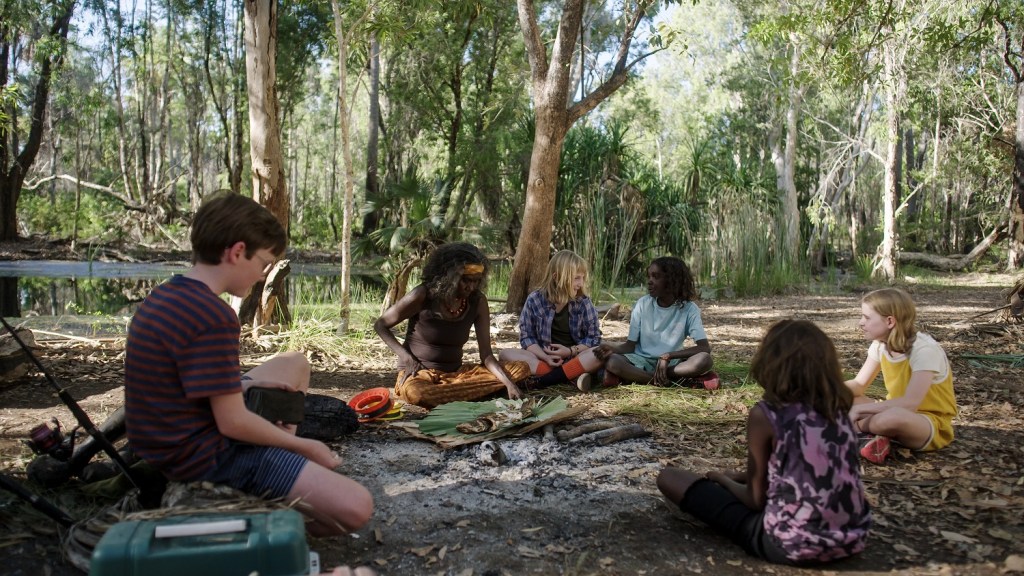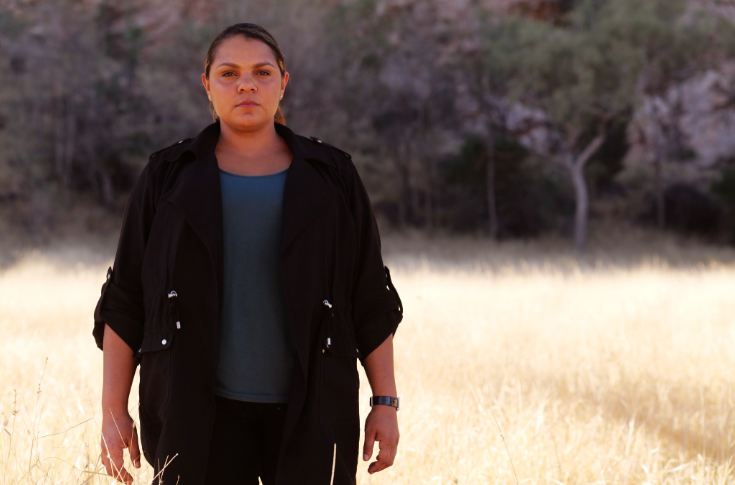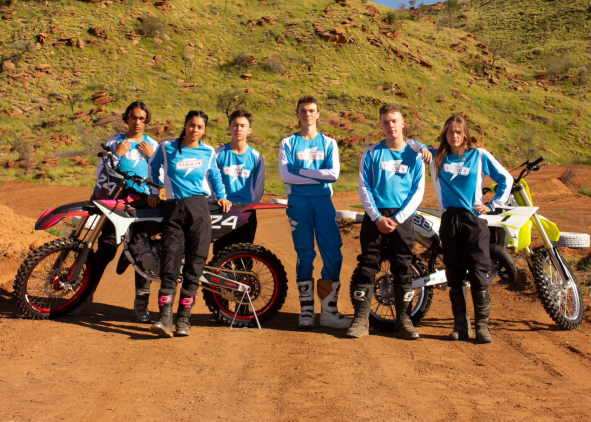With MaveriX, True Colours, Barrumbi Kids, Matt Wright’s Wild Territory, Outback Ringer season 2, The First Inventors and The Lost Flowers of Alice Hart, the 2021-22 financial year proved the biggest year of production yet for the Northern Territory.
The seven projects contributed more than $13.4 million in direct spend, a bumper result that has delighted Screen Territory director Jennie Hughes. The purple patch is made all the more impressive given many of the projects had to contend with pandemic-related complications like border closures.
While typically the Territory is known for producing one-off documentary and breakout films like Samson and Delilah, Sweet Country and High Ground, the last 18 months have seen a shift towards large-scale TV series like MaveriX, True Colours and Barrumbi Kids, as well as docuseries.
Hughes says the quick succession of these projects has contributed to a growth of the overall industry, with Screen Territory keen to throw its weight behind each of them.
In MaveriX, the agency put in a record $1.5 million, while in Barrumbi Kids it invested around $795,000. Hughes notes it will always put extra money in because “we want to get them up”.
“It’s been really exciting for the sector, because they’re now seeing what’s possible,” she tells IF.
“Because we have a smaller cohort of filmmakers, we’re able to put more into the productions.
“That’s good because it’s not cheap to film up here; you’ve got challenges, whether it be the weather, where you’re filming and travel time – you can’t film in the middle of the day sometimes, for example; it gets too hot.”
Further, Hughes is excited to see the diversification in the types of projects the Territory is producing, like kids content in MaveriX and Barrumbi Kids.

“For the first time we’ve got two major children’s series,” she says.
“MaveriX was a very ambitious series, and challenging. You’re working with bikes, children and stunts. And Barrumbi now, which is just such a beautiful series based on Leonie Norrington’s books. We’ve got three books, they’ve done one and I’d love to do another series.”
In addition to its homegrown projects, Screen Territory is increasingly keen to lure inbound production. Amazon’s The Lost Flowers of Alice Hart was the first secured for the NT via its new production incentive, launched in 2021. The Sigourney Weaver starrer, which also shot in NSW, utilised locations around King’s Canyon and the Alice Springs Desert Park.
The Production Attraction Incentive Fund is aimed at footloose production that will spend a minimum of $2 million in the Territory. Its overall pot tallies $3.1 million, but Hughes notes the agency also has access to additional funds if needed.
“We’re open for business,” Hughes says.
“We don’t have studios up here, but we can convert our convention centre if we need to. We’ve certainly got funding; the government’s got appetite for it so we can put more money in if we need to – we’ve got a clear directive on that.”

For every dollar Screen Territory invests, it expects $4 back into the economy. Hughes observes that the NT government is supportive of the industry, having particularly seen its economic value through COVID when productions generated revenue for local communities at a time when key sectors like tourism were at a standstill. This recognition is reflected in the fact that Screen Territory is one of just two nominees at the Chief Ministers Awards for ‘Excellence in Building A Strong Economy’.
With shows like MaveriX and Matt Wright’s Wild Territory going out on Netflix around the world and The Lost Flowers of Alice Hart on Amazon, the government also understands the clear potential for crossover with tourism. Indeed, Tourism NT is also working on a campaign off the back of Barrumbi Kids, which shot in Beswick and Barunga.
The significant growth in production in the NT and across the country, combined with the difficulty of flying people in from interstate during lockdowns, has meant Screen Territory has had to – like many other state agencies – turn its focus to training and capacity building over the past year.
With Arts NT, it has partnered with NIDA to deliver a series of face-to-face courses in specific areas designed to fill skills shortages and build the talent pool. They cover topics such as producing, writing, acting, directing, make up, costume design, props making, audition preparation and screen tests.
While workshops are held in Darwin, Screen Territory will cover travel for those who want to attend from elsewhere in the NT. Hughes notes many attendees haven’t come from screen or arts backgrounds, but have been curious to get a taste of the industry. The hope now is that some of these students can be funneled into attachment programs.
With the NT lacking screen programs at a VET or higher education level, she’s keen to continue to partner with NIDA, as well as AFTRS, the local Charles Darwin University and other tertiary providers to deliver further education programs into the future.
“It’s easier for people to study here at the end of the day. Especially with Indigenous communities, if you have to travel down to Sydney – going out of community, it’s challenging. You haven’t got that support network on the ground. We just want to make it accessible.”
In this sense, that the NIDA courses were in-person, and not on Zoom, was vital, with Hughes noting that filmmakers from the NT can often feel isolated. Screen Territory has a “fairly healthy” travel budget, and actively encourages creatives to attend events like Screen Forever, the Australian International Documentary Conference (AIDC) and the AACTA Awards.
“We really need people to get in front of the commissioners and to go and see other producers as well, to see what partnerships we can strike.”
Likewise, Hughes is keen for commissioners to get up to the Territory, and to observe its great talent, particularly that of First Nations creatives, the depth of place and stories.
“You get very different stories here; a different lens on storytelling,” she says.
“I think it’s just a matter of us convincing [commissioners] it’s worthwhile backing our projects. The good thing now is we’ve got such a body of work that’s come through.”
Further, she’d like more collaboration between NT filmmakers and creatives in other states, noting the success of Ambiance Entertainment partnering with Tamarind Tree Pictures on Barrumbi Kids and Ronde’s Ben Davies working with NT director Cian McCue on the First Inventors and Tommy Lawrence on Outback Ringer.
Screen Territory recently ran NT On Screen week as part of the Darwin International Film Festival, with free screenings of Outback Ringer, MaveriX, Matt Wright’s Wild Territory, Barrumbi Kids, and Three Thousand Years of Longing, followed by a Q&A Ray Martin-hosted with cinematographer John Seale, who was in town for the Australian Cinematographers Society (ACS) NT Awards.
The agency also hosted the NT Screen Summit over two days, a conference program bringing together ABC, SBS and producers behind many of the recent NT productions.
“We want to do more of those things, where we’re bringing the screen industry to the NT,” Hughes says.
Looking forward, she’s keen to keep the pipeline going, with the agency currently considering how it can fund script editing and the like through grant programs.
“We want to put a lot into development and nurturing our newer filmmakers, making sure they get the support that they need all the way through. We’re looking at how we can do that at the moment,” she says.
“We want to get more content coming through, more filmmakers coming through. We still think there’s a vast array of talent that we haven’t even tapped into.”


